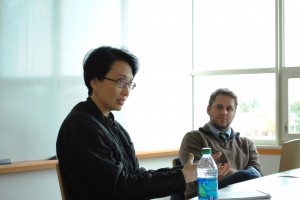Alumni Scholar May-Lee Chai ’89, writer of novels and memoirs including the recent Hapa Girl, presented a talk on Thursday entitled “From Memory to Memoir: Writing More Than You Know” as part of the Writers@Grinnell program.

When did you become interested in writing?
I wrote for the Scarlet & Black all four years when I was at Grinnell. So I’ve always been interested in writing. I just didn’t know what kind of writing I would go into when I was a student here. But I knew I wanted to write.
What is one memory of Grinnell during your senior year that you’ll never forget?
Senior year, it was a different type of campus. So, senior year, we didn’t have personal computers, we had to go to the computer center. It wasn’t open 24/7, so I was working on a senior thesis. And I remember I would go to the computer center in the middle of campus and have to walk back to my dorm in the middle of the night, like at 4 o’clock in the morning when it closed. And so I remember walking across campus in the snow, after trying to stay up late typing my thesis notes. I can remember that very vividly because it was a very quiet and a very beautiful Grinnell moment.
I know this is a hard question for writers, but what is one of your top ten favorite books and why?
A book I read in Grinnell, while I was a student, Marguerite Duras’s novel The Lover. I first read it in French, I don’t think English was available yet, this was way back in the 80’s, it was L’Amant. I read it my freshman or sophomore year in Grinnell and did a report and presentation on it. It is a haunting novel of a young, white French girl in colonial Vietnam who has a love affair with an older Chinese man. And it has all these themes that have been in my life and in my writing, with the mix of cultures and history and a young woman’s experience. And also it’s beautifully written. There’s a movie version—do not see the movie! Read the novel, read the novel!
Where do you get your inspiration to write novels?
I did a nonfiction family memoir about my grandmother in China and how she basically saved the family during World War II. And that’s called The Girl From Purple Mountain. Then I did a memoir called Hapa Girl and that was basically my experiences, my family’s experience in the midwest in the 1980s. We were a mixed race family, and we moved to a small town where we were the first Chinese-White family they’ve ever seen, and people were very violent. I put in the historical context of that. Then I did a straightforward nonfiction book with my dad called China A-Z. And that’s basically just to give people a basic understanding of concepts and history that they need to understand about China. So I’ve done three nonfiction, two novels, a collection of short stories and a third novel which I just completed.
When did you move to creative writing?
After journalism, I decided to make a concerted effort to write creatively. I had done my Master’s at Yale in East Asian studies. Then I had this cancer scare, and I thought I had cancer—I had this growing tumor. Originally I thought I would go into a PhD program, get a PhD, professor, go that way. Then I thought, the writing is frivolous, I don’t know anyone who’s a writer, who does that? Then when I had the cancer scare I thought, Oh my God, I could be dead! I’m going to pursue the dream! So instead, I enrolled in a creative writing program, and decided to start going with the dream of writing creatively, and I did. And so that’s what made the difference. The one piece of advice I can give students is sometimes you just have to dare to pursue your dream. Because we all tell ourselves a million reasons: oh, I should be practical, I should do this later, I need to do something else first. This was in my 20s, you never know how much time you have. Pursue the dream first.
I know you’ve traveled a lot, how was that experience?
I went to France and I went to China and these were life changing experiences. This gave me the depth and breadth of experience to write about, so I can write about global issues, and I can write about the world and I do. So I’m telling you, do it. In this economy, there’s this anxiety that a lot students feel that you have to point yourself in one career option early and stay on it as you need something practical. But you’ve already chosen a liberal arts education, which people think is not practical. There’s nothing more important than your liberal arts background. It will prepare you for everything else in life. I’m not just saying that because I went to Grinnell. Here I am, I survived, it’s been very useful. I faced that same dilemma, I was part of the 80s recession, I graduated into a recession. I know what it’s like to fear unemployment and have practical skills. I’m telling you, your liberal arts background teaches you how to learn, it teaches you skills that you will use forever. In this new age, you’ve got to be diverse.
-compiled by Queenster Nartey


















































